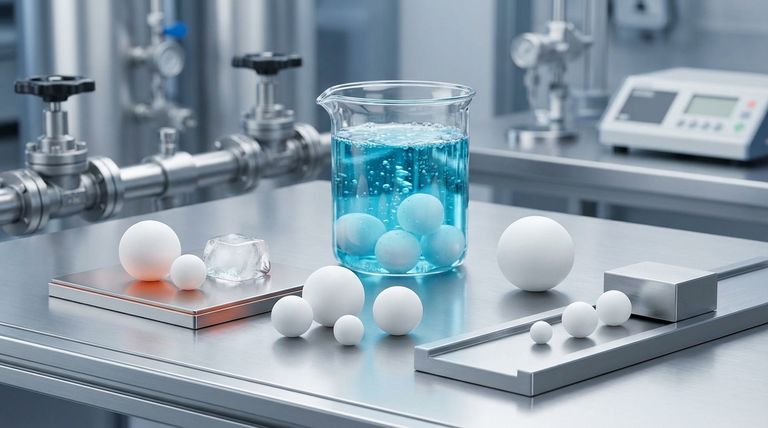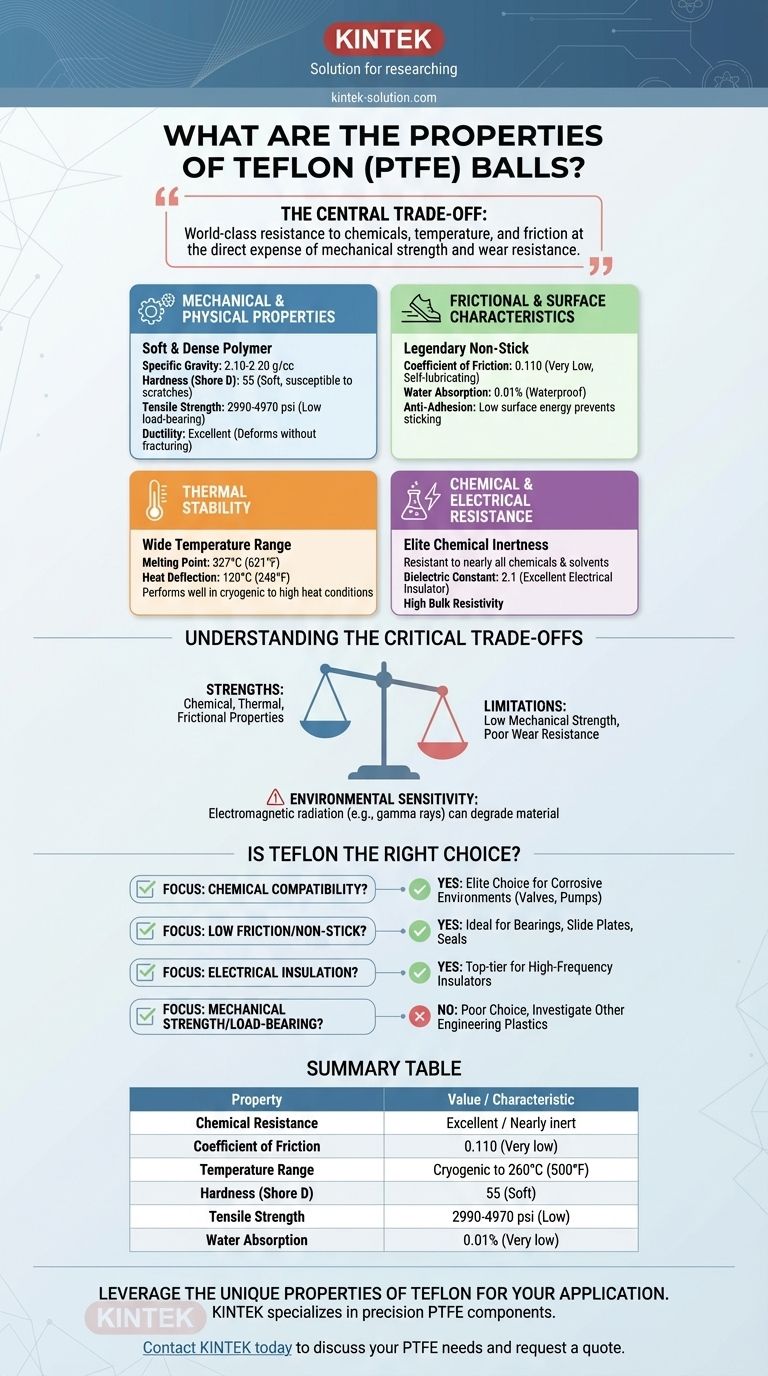In essence, Teflon (PTFE) balls are defined by three elite characteristics: exceptional chemical inertness, an extremely low coefficient of friction, and a wide operating temperature range. Their key properties include a specific gravity of 2.1-2.2 g/cc, a melting point of 327°C (621°F), a Shore D hardness of 55, and a very low water absorption rate of 0.01%.
The central trade-off with Teflon (PTFE) is clear: you gain world-class resistance to chemicals, temperature, and friction at the direct expense of mechanical strength and wear resistance. Understanding this balance is the key to using it effectively.

Unpacking the Core Properties of Teflon (PTFE)
To determine if Teflon balls are right for your application, it's essential to understand what the numbers mean in a practical context. We can group their defining traits into four main categories.
Mechanical & Physical Properties
Teflon is a relatively soft and dense polymer. Its mechanical properties are modest compared to other engineering plastics.
- Specific Gravity: 2.10 – 2.20 g/cc. This makes it one of the heavier plastics.
- Hardness: 55 on the Shore D scale. This indicates a soft material, susceptible to scratches and deformation under load.
- Tensile Strength: 2990-4970 psi. This is the force required to pull the material apart, and Teflon's rating is low, highlighting its limited load-bearing capacity.
- Flexural Strength: 2490 psi. This measures its ability to resist bending forces, which is also relatively low.
- Ductility: Despite low strength, Teflon has excellent ductility, meaning it can deform without fracturing, which makes it an excellent material for seals.
Frictional & Surface Characteristics
This is where Teflon truly excels. Its surface properties are legendary and are often the primary reason for its selection.
- Coefficient of Friction: 0.110. This is an extremely low value, making the material inherently self-lubricating and giving it its famous "non-stick" quality.
- Water Absorption: 0.01% over 24 hours. Teflon is waterproof and non-porous, refusing to absorb moisture.
- Anti-Adhesion: The material's low surface energy prevents other substances from sticking to it, which is critical in non-stick and sealing applications.
Thermal Stability
Teflon performs reliably across a very wide range of temperatures, from cryogenic conditions up to high heat.
- Melting Point: 327°C (621°F). This is a very high melting point for a polymer.
- Heat Deflection Temperature: 120°C (248°F). This is the temperature at which the material will begin to deform under a specific load. It's important to note this is significantly lower than its melting point.
- Temperature Range: It maintains good flexibility and properties at very low temperatures and performs well under extreme environmental shifts.
Chemical & Electrical Resistance
Teflon is one of the most chemically resistant materials known, making it suitable for use in highly corrosive environments.
- Chemical Inertness: It is non-reactive and resistant to nearly all chemicals, solvents, and corrosive agents. Only certain alkali metals can affect it.
- Dielectric Constant: 2.1. This low value, combined with high bulk resistivity, makes it an excellent electrical insulator. The strong carbon-fluorine bonds prevent electrical charge from flowing easily.
Understanding the Critical Trade-offs
No material is perfect. The unique strengths of Teflon come with clear limitations that are crucial to consider for any design.
Strength vs. Resistance
The primary trade-off is mechanical performance. Teflon's outstanding chemical, thermal, and frictional properties come at the cost of low mechanical strength and poor wear resistance. It is not suitable for high-load or high-abrasion applications where materials like Nylon or Delrin would be a better choice.
Environmental Sensitivities
While incredibly stable, Teflon's properties can be altered by certain conditions. Exposure to electromagnetic radiation, such as gamma rays, can degrade the material and impact its mechanical integrity.
Is Teflon the Right Choice for Your Application?
Your decision should be based on which properties are most critical for your project's success.
- If your primary focus is chemical compatibility: Teflon is an elite choice for components in corrosive environments, such as valves, pumps, and chemical processing equipment.
- If your primary focus is low friction or non-stick surfaces: Teflon is ideal for applications like bearings, slide plates, and high-performance seals where self-lubrication is key.
- If your primary focus is electrical insulation: Its excellent dielectric properties make it a top-tier material for high-frequency insulators and electronic components.
- If your primary focus is mechanical strength or load-bearing: Teflon is a poor choice, and you should investigate other engineering plastics designed for structural applications.
By understanding that Teflon is a specialized material, you can leverage its unparalleled resistance properties for the exact applications it was designed to solve.
Summary Table:
| Property | Value / Characteristic |
|---|---|
| Chemical Resistance | Excellent / Nearly inert |
| Coefficient of Friction | 0.110 (Very low) |
| Temperature Range | Cryogenic to 260°C (500°F) |
| Hardness (Shore D) | 55 (Soft) |
| Tensile Strength | 2990-4970 psi (Low) |
| Water Absorption | 0.01% (Very low) |
Leverage the unique properties of Teflon for your application. KINTEK specializes in the precision manufacturing of high-performance PTFE components, including custom balls, seals, and liners. We serve the semiconductor, medical, laboratory, and industrial sectors, delivering solutions from prototypes to high-volume production. Our expertise ensures you get the right balance of chemical inertness, low friction, and thermal stability for your most demanding environments.
Contact KINTEK today to discuss your PTFE component needs and request a quote.
Visual Guide

Related Products
- Custom PTFE Teflon Balls for Advanced Industrial Applications
- Custom PTFE Parts Manufacturer for Teflon Parts and PTFE Tweezers
- Custom PTFE Parts Manufacturer for Teflon Containers and Components
- Custom PTFE Square Trays for Industrial and Laboratory Use
- Custom PTFE Sleeves and Hollow Rods for Advanced Applications
People Also Ask
- What factors determine the different grades of PTFE balls available? Select the Right Grade for Your Application
- What are the available grades of PTFE balls? Choose the Right Grade for Your Application
- How do PTFE balls contribute to reduced maintenance costs? Extend Component Life and Cut Downtime
- How do the chemical properties of PTFE balls influence their performance? Unmatched Durability in Harsh Environments
- What temperature range can Teflon (PTFE) balls withstand? -200°C to +260°C Performance Guide



















